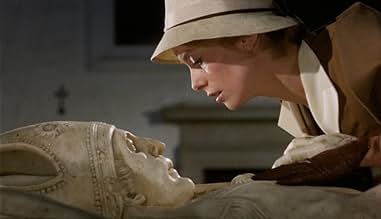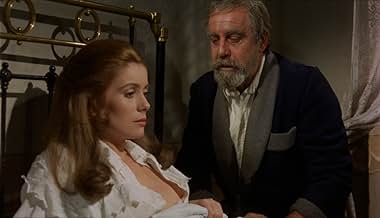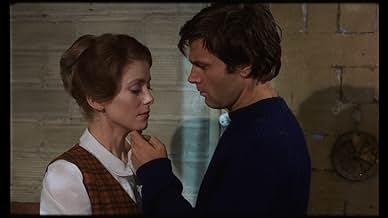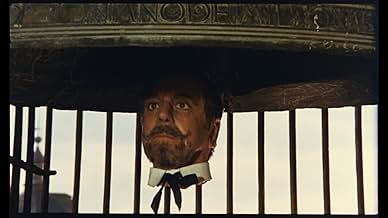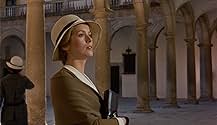Kurz nach dem Tod ihrer Mutter findet eine unschuldige und junge Frau Zuflucht im Haushalt ihres aristokratischen Vormunds mittleren Alters, der sie zum Opfer seiner sexuellen Annäherungen m... Alles lesenKurz nach dem Tod ihrer Mutter findet eine unschuldige und junge Frau Zuflucht im Haushalt ihres aristokratischen Vormunds mittleren Alters, der sie zum Opfer seiner sexuellen Annäherungen macht.Kurz nach dem Tod ihrer Mutter findet eine unschuldige und junge Frau Zuflucht im Haushalt ihres aristokratischen Vormunds mittleren Alters, der sie zum Opfer seiner sexuellen Annäherungen macht.
- Regie
- Drehbuch
- Hauptbesetzung
- Für 1 Oscar nominiert
- 11 Gewinne & 4 Nominierungen insgesamt
- Muchacha
- (as María Paz Pondal)
- Don Cándido
- (as Juan José Menéndez)
Empfohlene Bewertungen
Buñuel's attention to detail is extraordinary. Every scene is packed with visual interest. In some strange way, the decor forms an essential part of the structure; it is a facet of Buñuel's unique vision. Moreover, he not only knows exactly when to end a sequence, but how to end it. For instance, when Don Lope (Rey) puts down the dog and walks away, the camera follows not him but the dog: an endearing and brilliant touch, and there are many more. Compelling throughout, even spellbinding.
If this film were a framed picture hanging in a gallery, thousands would come to see it and Buñuel would be acclaimed as a great artist. He was a great artist, in fact, but the cinema is an ephemeral form and people forget. We need to buy the videos and watch these fine movies from time to time, just to remind ourselves that a film can be a significant art form and not merely a commercial product cynically synthesised to extract the largest amount of money from the greatest number of people.
This is the sensuous story of Tristana , a drama with surrealism and sour portrait upon social classes , catholicism , sexual abuses and many other things , being stunningly realized by the Spanish maestro of surrealism , the great Luis Buñuel . This is a typical Buñuel film , as there are a lot of symbolism , social critique , including mockery or wholesale review upon religion , especially Catholicism . Luis Buñuel was given a strict Jesuit education which sowed the seeds of his obsession with both subversive behavior and religion , issues well shown in a lot of films and that would preoccupy Buñuel for the rest of his career . Here Bunuel gives a perverse studio about religion , old age , desire along with deformity ; and was strongly cut by Spanish censorship . The film describes unequal status of women , heir to a long tradition of marginalization, subjugation, exploitation and lack of rights , subsequently suffragists and protest movements emerge in pro-women . Interesting and thought-provoking screenplay from the same Luis Buñuel and Julio Alejandro , Buñuel's usual screenwriter , based on the novel by Benito Pérez Galdós ; they pull off a straight-faced treatment of shocking subject matter . Bunuel's adaptation retains the spirit of protest written by Galdos, and moved to a later time in 40 years to the novel . Nice acting by Fernando Rey as an old man who falls for the innocent girl in his charge , to the point of result to be perhaps the best performance of his long career . Rey played various Buñuel films such as The Discreet Charm of the Bourgeoisie , That Obscure object of Desire and Viridiana . And Catherine Deneuve's finest most enigmatic acting as a young cynical woman who goes to live with her guardian and subsequently turned into a bitter incapacitated cripple . The film relies heavily on the relationship between them , as is developed a rare lover/father relationship with her . One of Bunuel's most serious and serene ¨Tristana¨ is packed with surreal moments , criticism , absurd situations , masochism and nightmares . Furthermore , Buñuel satirizes and he carries out outright critical to aristocracy , bourgeoisie and attack upon religion . Pretty good support cast gives fine acting ; it is mostly formed by nice Spanish actors such as Antonio Casas , Fernando Cebrian, Jose Maria Caffarel , Antonio Ferrandis , Jose Calvo , Sergio Mendizabal , Juanjo Menendez ,among others . Beautifully shot in Toledo with a splendid cinematography by Jose Aguayo . Tristana was voted tenth best Spanish film by professionals and critics in 1996 Spanish cinema centenary and nominated for an Oscar ,film Foreign Language.
Thid wry and dramatic motion picture was compellingly directed by Luis Buñuel who was voted the 14th Greatest Director of all time . This Buñuel's strange film belongs to his French second period ; in fact , it's plenty of known Spanish actors . Born in Calanda , Aragon (1900) , Buñuel subsequently moved to Madrid to study at the university there, where his close friends included Salvador Dalí and Federico García Lorca. After moving to Paris , at the beginning Buñuel did a variety of film-related odd jobs , including working as an assistant to director Jean Epstein . With financial help from his mother and creative assistance from Dalí, he made his first film , this 17-minute "Un Chien Andalou" (1929), and immediately catapulted himself into film history thanks to its disturbing images and surrealist plot . The following year , sponsored by wealthy art patrons, he made his first picture , the scabrous witty and violent "Age of Gold" (1930), which mercilessly attacked the church and the middle classes, themes that would preoccupy Buñuel for the rest of his career . That career, though, seemed almost over by the mid-1930s, as he found work increasingly hard to come by and after the Spanish Civil War , where he made ¨Las Hurdes¨ , as Luis emigrated to the US where he worked for the Museum of Modern Art and as a film dubber for Warner Bros . He subsequently went on his Mexican period he teamed up with producer Óscar Dancigers and after a couple of unmemorable efforts shot back to international attention with the lacerating study of Mexican street urchins in ¨Los Olvidados¨ (1950), winning him the Best Director award at the Cannes Film Festival. But despite this new-found acclaim, Buñuel spent much of the next decade working on a variety of ultra-low-budget films, few of which made much impact outside Spanish-speaking countries , though many of them are well worth seeking out . As he went on filming "The Great Madcap" , ¨The brute¨, "Wuthering Heights", ¨El¨ , "The Criminal Life of Archibaldo De la Cruz" , ¨Robinson Crusoe¨ , ¨Death in the garden¨ and many others . After returning his native country, Spain, by making ¨Viridiana¨ this film was prohibited on the grounds of blasphemy as well as ¨The milky way¨ or Via Lactea , both of them were strongly prohibited by Spanish censorship . This French-Spanish final period in collaboration with producer Serge Silberman and writer Jean-Claude Carrière with notorious as well as polemic films such as ¨Viridiana¨ , ¨The Discreet Charm of the Bourgeoisie" and ¨Belle De Jour¨. His last one was the notorious ¨That obscure object of desire¨ (1977) .
"Tristana" contains many of the common factors of Buñuel's movies: his total contempt for the ruling sectors of society and the rich people, for hypocrisy and Puritanism; his irreverence, and a wicked and implicit sexual content. Only the man who made "Belle de Jour" would dare to amputate a leg to the goddess Deneuve (one of the most beautiful creatures that ever walked the earth). Fernando Rey plays a typical Spanish "hidalgo" that's come down in the world and that sexually harass his stepdaughter.
So, Buñuel not only hadn't lost his touch with the years, on the contrary, he felt more and more free as the time went by to let his genius flow *My rate: 8/10
One thing that's extraordinary about how Bunuel directs and allows for his actors to play the scenes is that the emotions are only heightened to a certain level, and never with the aid of things like music or tears. It is what it is: Don Lope has taken care of Tristana as her guardian since her mother died, and now has inserted himself as her father/husband figure, with his servant Saturna (stern-faced but understanding Lola Gaos) a kind of unofficial confessional. Tristana wants some freedom, just to go out and walk around, and feels caught by Don Lope even when not doing anything... until she meets Franco Nero's Don Horacio, a painter who could promise a new life. This goes without saying that one should take it for granted that Tristana isn't *that* young and could take care of herself without Lope, but maybe this is part of the point of the slight absurdity- and eventual tragedy- of this struggle.
Two years go by after she leaves Lope for Horacio, with a tumor in her leg. She's now a cripple, and now once again a kind of mental prisoner in Lope's home; the complexity of old man Lope as being duplicitous is seen right after he finds out she's sick and Horacio asks for Lope to help keep her home, and he nearly skips home saying "she'll never leave again!" All of this, leading up to a final twist that is very satisfying if extending the tragic dimension of Lope and Tristana, would be soapy and tawdry and, possibly, very standard in other hands. For Bunuel, there's a lot of personal ground here; I wonder at times if Rey is a little like one of those actors a director of Bunuel's auteur-stature uses as a means of expressing himself through an actor, or if it's just because he's so good at playing wicked AND sympathetic bourgeois. And the mixture of ideas, if not really themes, covering what's love and over-control, religion, deformity, a free will are potent and exciting even in such subtle and (as Maltin said) serenely filmed territory.
It's also a minor triumph for Deneuve, who between this and Belle de jour did some of her best work as an actress for the notorious surrealist. Her character's continual dream of Lope's beheaded top dangling from a church tower is the closest we see to a classic surrealist scene, though it's reminiscent of Los Olvidados as brilliantly expressing one character's mind-set. Deneuve is up for the challenge of putting up a tough interior and exterior presence; she gets paler towards the end (if this was for real or just a bad print I couldn't tell), and there's a lot of pain in her eyes and expression throughout. It's great work for one of the director's most subtly demanding works- beneath its conventional framework of a love-triangle story is sorrow and horror at the human condition.
Wusstest du schon
- WissenswertesLuis Buñuel said that many of Tristana's idiosyncrasies, including her habit of asking people to choose between nearly identical objects, was based on the director's sister's similar habits.
- Zitate
Don Lope: Poor workers. Cheated and then beaten. Work is a curse, Saturno. Down with work that you have to do to survive. That work isn't honorable, as some say. All it does is fatten the exploiting swine. However, what you do for pleasure ennobles man. If only we could all work like that. Look at me, I'd rather be hanged than work! So, I live poorly, but I live without working.
- Alternative VersionenOriginally released in Europe at 105 minutes.
- SoundtracksÉtude No 12 in C minor, Op 10 'Revolutionary'
Written by Frédéric Chopin
Top-Auswahl
- How long is Tristana?Powered by Alexa
Details
- Erscheinungsdatum
- Herkunftsländer
- Offizieller Standort
- Sprache
- Auch bekannt als
- Mảnh Đời Của Tristana
- Drehorte
- Paseo Recaredo, Toledo, Castilla-La Mancha, Spanien(opening and closing scenes with Saturna, Viridiana and the mute boy)
- Produktionsfirmen
- Weitere beteiligte Unternehmen bei IMDbPro anzeigen
Box Office
- Bruttoertrag in den USA und Kanada
- 14.586 $
- Eröffnungswochenende in den USA und in Kanada
- 4.754 $
- 14. Okt. 2012
- Weltweiter Bruttoertrag
- 14.586 $
- Laufzeit1 Stunde 39 Minuten
- Sound-Mix
- Seitenverhältnis
- 1.66 : 1
Zu dieser Seite beitragen



